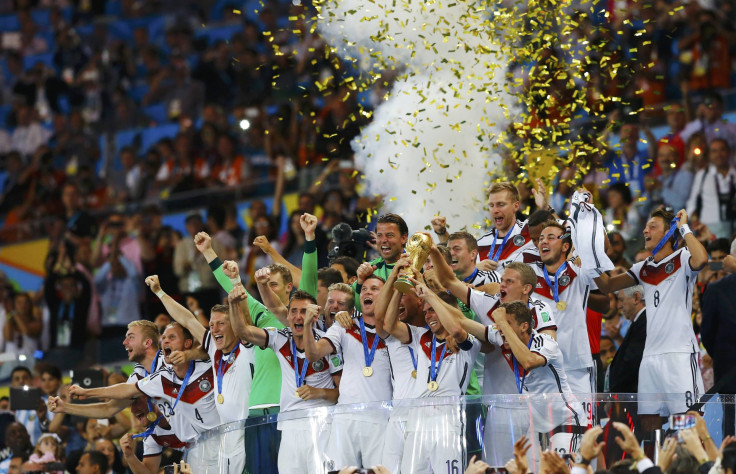World Cup 2018: Predictions And Early Look Ahead To Russia; Why Germany Can Repeat Success Of 2014

We may be just days removed from Mario Götze’s winning goal in the 2014 World Cup final, but the thoughts of many are already turning to the next World Cup in Russia in four years’ time. Certainly many of the countries’ federations have already, or will be in the next few days, taking decisions with a view to ensuring success when the tournament returns to Europe. And with Germany having finally shattered the outdated notion that teams have a significant advantage playing in their own continent, it is a tournament that could be wide open.
Germany’s triumph was the culmination of a decision to overhaul their soccer infrastructure more than a decade ago. That revolution in youth development and toward producing players with a high level of technical skill leaves them in good stead to looking forward to Russia. While they have not brought about the same kind of tactical innovation as Spain, Germany can have thoughts about a similar spell of dominance. The scary fact for the rest of the world to consider is that the team that won the World Cup was not even at full strength. Marco Reus and Ilkay Gundogan were among the players who were ruled out of the tournament through injury, while Bastian Schweinsteiger and Sami Khedira only came back to full fitness near the end of the tournament and then the latter had to sit out the final.
The player that scored the winning goal, Götze, is still only 22-years-old, while two other squad members, Julian Draxler and Matthias Ginter, are aged just 20. Having got the monkey off their back that this generation lacked the mentality to win the big one, the future is very much bright.
The same can’t be said for the side they beat in the final. Argentinians will not only be ruing their team’s loss at the Maracanã, but the sense that this could well have been their last opportunity to add to their two World Cups for some time. Argentina won the Under-20 World Cup an incredible five times between 1995 and 2007, but didn’t even qualify last time around. The amazing production line has dried up. The youngest player in their final lineup, and indeed in their squad, was 24-year-old Marcos Rojo. Inspirational captain Javier Mascherano will be 34 come the next World Cup, while the main stars of the team were all in their prime this time around, with Lionel Messi, Sergio Agüero, Ángel di María and Gonzalo Higuaín all aged 26 at the start of the tournament.
It remains to be seen what action Brazil takes after their humiliation on home soil in the semifinals. It should be the catalyst for the same change that their vanquishers Germany initiated. Even if that does happen it will take some time for Brazil to start producing the kind of players again who can form a proactive side capable of controlling matches against top-level opponents. Still, young players like Neymar and Oscar will ensure that Brazil remains a factor.
The future is uncertain, too, for the other beaten semifinalists, the Netherlands. Their squad featured a large number of young players, but they have yet to prove themselves capable of matching the quality that has come before them. It took the tactical ingenuity of departing-coach Louis van Gaal to guide them to exceeding expectations this time around.
One of the biggest stories of this World Cup was the ending of Spain’s reign in the group stage. It was a massive disappointment, but, while the curtain came down on a group of players who had won three successive major tournaments, it needn’t signify a long absence from the summit of the international game. Not replacing some of his aging stars was seen as such a fault of coach Vicente del Bosque because there is ample young talent to come in. Spain won the European Under-21 Championship last year and their cohesive youth structure means they should be a force again.
The future is bright too for France. Having rebuilt their reputation after recent major-tournament disasters, despite ultimately exiting meekly, there is reason to think that they will be a factor on home soil in Euro 2016 and beyond. Paul Pogba was the only player from France’s victorious 2013 Under-20 World Cup win to make an impression in Brazil, but plenty more are waiting in the wings with the ability to star on the international stage.
Belgium, too, will hope to build on a quarterfinal berth. Coach Marc Wilmots was unable to get the best out of the talent at his disposal, despite a credible place in the last eight, but the pieces are in place for Belgium to continue to be a factor in Russia. And the country that came undone against Belgium, the United States, likewise has reason for optimism. This World Cup did not see evidence of the revolution Jürgen Klinsmann is attempting to carry out on the country’s style of soccer but progress will be expected over the next four years.
World Cup 2018 Betting Odds (Bovada.lv)
5/1 Germany
7/1 Argentina
8/1 Brazil
8/1 Spain
10/1 France
12/1 Netherlands
16/1 Belgium
16/1 Italy
20/1 England
20/1 Russia
25/1 Colombia
25/1 Portugal
33/1 Chile
33/1 USA
50/1 Bosnia-Herzegovina
50/1 Uruguay
66/1 Czech Republic
66/1 Mexico
66/1 Poland
66/1 Switzerland
66/1 Ukraine
© Copyright IBTimes 2025. All rights reserved.





















